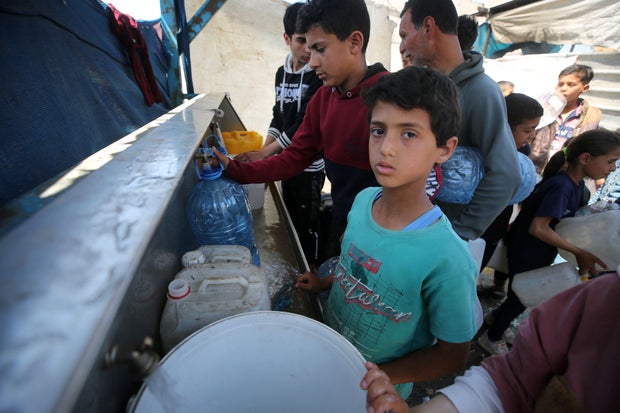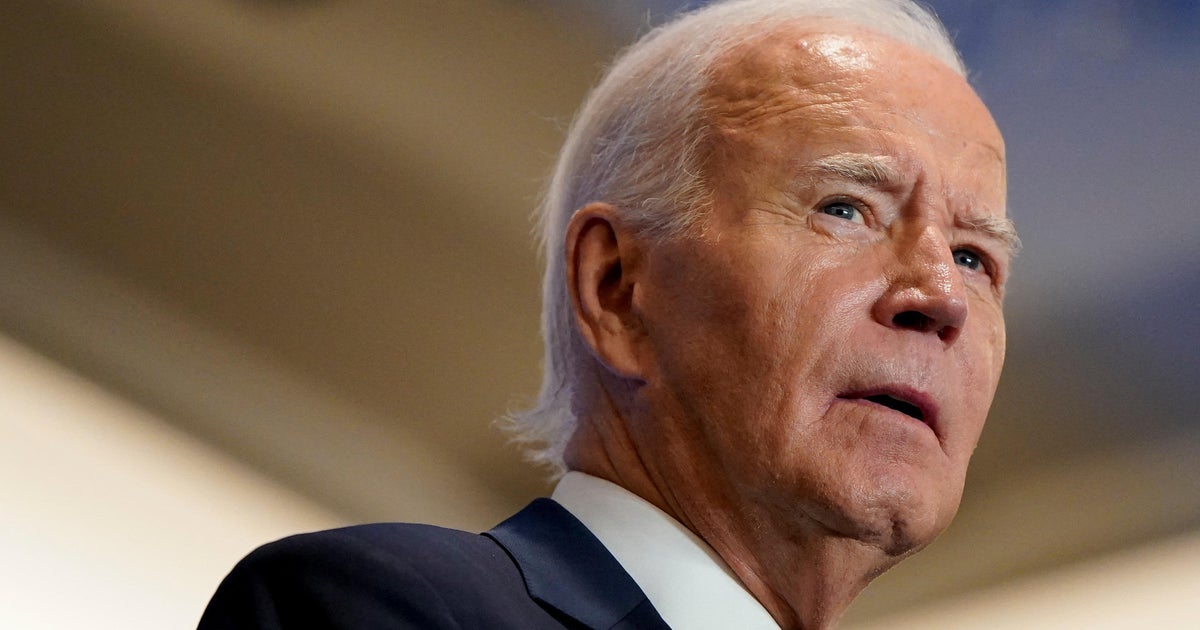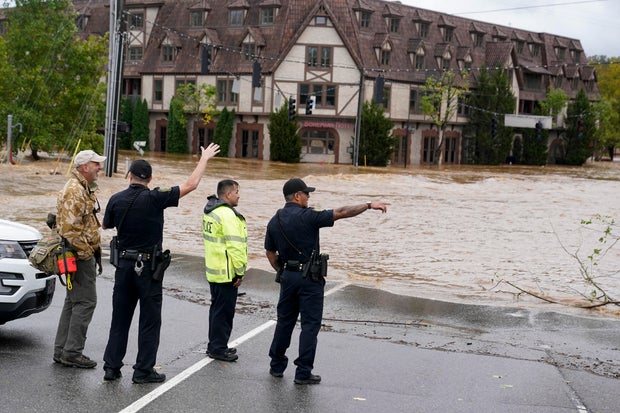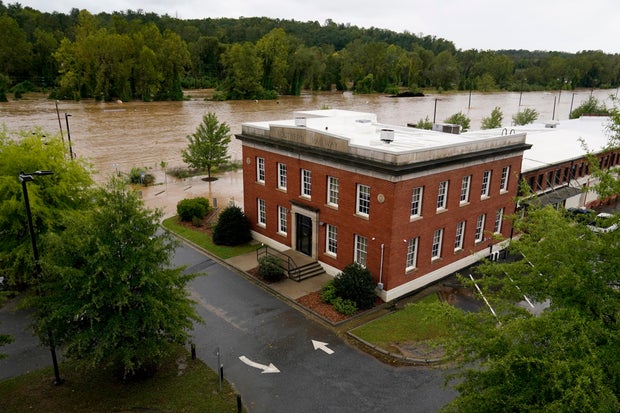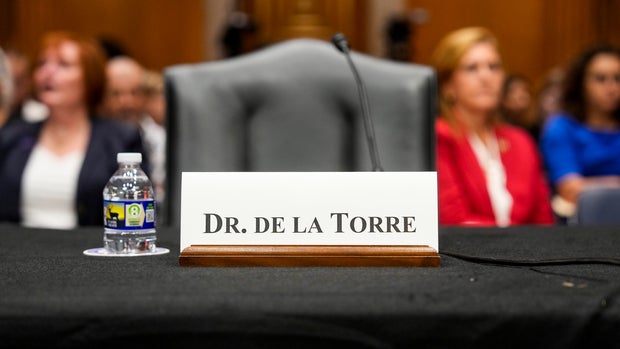CBS News
Israel’s Netanyahu is determined to launch a ground offensive in Rafah. Here’s why, and why it matters.
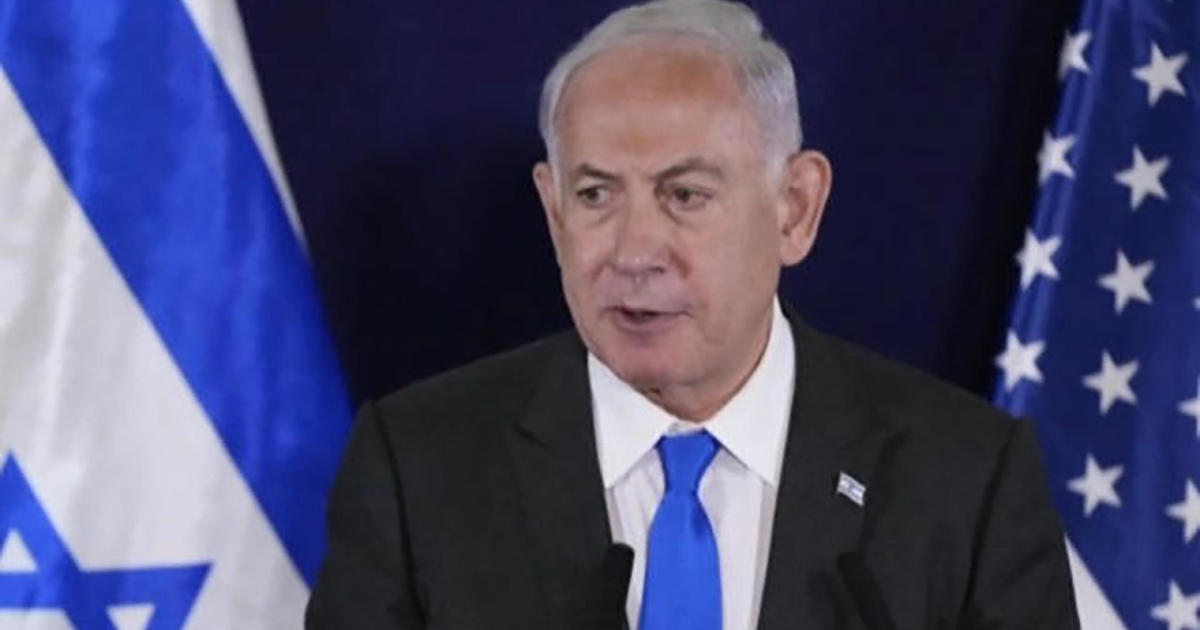
Israel is determined to launch a ground offensive against Hamas in Rafah, Gaza’s southernmost town, a plan that has raised global alarm because of the potential for harm to more than a million Palestinian civilians sheltering there — in addition to the risk of harming Israeli hostages who could be held captive in the city.
Even as the U.S., Egypt and Qatar push for a cease-fire deal they hope can avert an assault on Rafah, Prime Minister Benjamin Netanyahu repeated Tuesday that the Israel Defense Forces would move in on the city “with or without a deal” to achieve his government’s stated goal of destroying the Hamas militant group in response to its bloody Oct. 7 terrorist attack.
Under pressure, Netanyahu vows to order Rafah incursion
“We will enter Rafah because we have no other choice. We will destroy the Hamas battalions there, we will complete all the objectives of the war, including the return of all our hostages,” Netanyahu said Tuesday, the day before he met visiting U.S. Secretary of State Antony Blinken.
U.S. State Department Handout
Speaking Thursday at a memorial ceremony for IDF soldiers killed in Gaza, Netanyahu acknowledged “differences of opinion within” his cabinet about how to proceed, but he added that a “decision was made,” and “we will do what is necessary to win and overcome our enemy, including in Rafah.”
Netanyahu is under huge, opposing political pressure from hostage families pushing for a cease-fire agreement to bring their loved ones home from Gaza, and far-right members of his fragile coalition government who’ve threatened to drop their support for his leadership if he accepts any truce agreement.
Israel has approved military plans for its offensive and has moved troops and tanks to southern Israel in apparent preparation — though it’s still unknown when or if it will happen.
About 1.4 million Palestinians — more than half of Gaza’s population — are jammed into the town and its surroundings. Most of them fled their homes elsewhere in the territory to escape Israel’s onslaught and now face another wrenching move, or the danger of facing the brunt of a new assault. They live in densely packed tent camps, overflowing U.N. shelters or crowded apartments, and are dependent on international aid for food, with sanitation systems and medical facilities infrastructure crippled.
Why Rafah is so important
Since Israel declared war on Hamas in response to its unprecedented attack, Netanyahu has made it clear that his central goal is to destroy the group’s military capabilities.
Yasser Qudaih/Anadolu via Getty Images
Israel calls Rafah Hamas’ last major stronghold in the Gaza Strip — a densely populated Palestinian territory that Hamas had controlled for almost two decades before this war. Operations across the enclave have dismantled 18 of the militant group’s 24 battalions, according to the IDF. But even in northern Gaza, the first target of the offensive, Hamas has regrouped in some areas and continued to launch attacks.
Israel says Hamas has four battalions in Rafah and that it must send in ground forces to topple them. Some senior militants could also be hiding in the city.
Why there’s so much opposition to Rafah offensive
The U.S. has urged Israel not to carry out the operation without a “credible” plan to evacuate the more than 1 million civilians believed to be taking refuge in Rafah. Egypt, a strategic partner of Israel, that sits just across Gaza’s southern border from Rafah, has said an Israeli military seizure of the border — which is supposed to be demilitarized — or any move to push Palestinians into Egypt would threaten its four-decade-old peace agreement with the Jewish state.
Israel’s previous ground assaults, backed by devastating bombardment since October, have leveled huge parts of northern Gaza and the southern city of Khan Younis and caused widespread civilian deaths, even after evacuation orders were given for those areas. Gaza’s Hamas-run Health Ministry puts the death toll in excess of 34,000 and says most of those killed have been women and children, though it does not distinguish between civilian and combatant deaths.
Israel’s military says it plans to direct civilians in Rafah to “humanitarian islands” in central Gaza before its offensive. It says it has ordered thousands of tents to set up new camps for the displaced. But it hasn’t given details of its plan, and it remains unclear whether it’s logistically possible to move so many people all at once without causing even more suffering for a population already exhausted by multiple displacements and months of bombardment.
The U.N. Secretary-General renewed his warning that a military offensive in Rafah would be “an unbearable escalation, killing thousands more civilians and forcing hundreds of thousands to flee.”
Some entry points from Israel to Gaza in the north have been reopened recently, and the U.S. has promised a new, temporary port to bring in more supplies by sea will be ready in weeks. But the majority of food, medicine and other material enters Gaza from Egypt through Rafah or the nearby Kerem Shalom crossing — traffic that would likely be impossible during an invasion.
The U.S. has urged Israel to opt for more pinpoint operations against Hamas in Rafah, without a major ground assault.
“We don’t want to see a major ground operation in Rafah,” U.S. National Security Council spokesperson John Kirby said after Netanyahu’s latest comments. “Certainly, we don’t want to see operations that haven’t factored in the safety, security of” civilians taking refuge in the city.
Netanyahu’s political calculations
The question of attacking Rafah carries heavy political implications for Netanyahu. His government has been threatened with collapse if he doesn’t go through with it. Some of his ultranationalist and conservative religious governing partners could pull out of the coalition if he signs onto a cease-fire deal that prevents an assault.
Critics of Netanyahu say he’s more concerned with keeping his government intact and staying in power than in Israel’s national interest — an accusation he’s denied repeatedly.
One of his coalition members, Finance Minister Bezalel Smotrich, said Tuesday that accepting a cease-fire deal and not carrying out a Rafah operation would amount to Israel “raising a white flag” and giving victory to Hamas.
On the other hand, Netanyahu risks increasing Israel’s international isolation — and alienating its top ally, the United States — if it does attack Rafah.
His vocal refusals to be swayed by world pressure and his promises to launch the operation could be aimed at placating his political allies, even as he considers a cease-fire deal. Or, he could bet that international anger will remain largely rhetorical if he goes ahead with the attack.
The Biden administration has used progressively tougher language to express concern over Netanyahu’s conduct of the war, but it has also continued to provide weapons to Israel’s military, and vital diplomatic support.
CBS News
North Carolina’s Asheville devastated after Helene’s damage cuts power, floods roads

Floodwaters pushed by the remnants of Hurricane Helene left North Carolina’s largest mountain city largely cut off Saturday by damaged roads and a lack of power and cellphone service, part of a swath of destruction across southern Appalachia that left an unknown number dead and countless worried relatives unable to reach loved ones.
In North Carolina alone, more than 400 roads remained closed on Saturday as floodwaters began to recede and reveal the extent of damage. North Carolina Gov. Roy Cooper said that supplies were being airlifted to that part of the state. Cooper said two people died in his state, Helene killed at least 52 people across multiple states.
Among those rescued from rising waters was nurse Janetta Barfield, whose car was swamped on Friday morning as she left an overnight shift at Asheville’s Mission Hospital. She said she watched a car in front of her drive through standing water and thought it was safe to proceed. But her car stalled, and within minutes water had filled her front seat up to her chest. A nearby police officer who saw her car stall helped her to safety.
“It was unbelievable how fast that creek got just in like five minutes,” Barfield said.
Erik Verduzco / AP
Early on Saturday morning, many gas stations were closed because they didn’t have electricity, and the few that were open had hourlong lines wrapped around the block. The hub of tourism and arts, home to about 94,000 people, was unusually still after floodwaters swamped neighborhoods known for drawing visitors including Biltmore Village and the River Arts District, which is home to numerous galleries, shops and breweries.
More than 700,000 power customers were without power across North Carolina, including 160,000 in Buncombe County. Interstate 40 and I-26 were impassible in multiple locations, and a state transportation department map showed that most routes into Asheville and across much of the mountains were snarled. North Carolina’s Department of Transportation posted on social media on Saturday afternoon that “all roads in Western North Carolina should be considered closed.”
In Asheville, there was no cellular service and no timeline for when it would be restored.
“We have had some loss of life,” County Emergency Services Director Van Taylor Jones told reporters. However, he said they were not ready to report any specifics. Officials have been hindered in contacting next of kin by the communications outages. Asheville police instituted a curfew from 7:30 p.m. Friday to 7:30 a.m. Saturday.
“The curfew is to ensure the public’s safety and will be in effect until further notice,” police said.
Asheville transit services were also suspended, police said. The city advised residents to boil “all water used for human consumption,” as there was at least one significant water line break during the storm. Many residents might not be getting water or reduced or no pressure water.
Jones said the area experienced a cascade of emergencies that included heavy rain, high winds and mudslides. Officials said they tried to prepare for the storm but its magnitude was beyond what they could have imagined.
“It’s not that we (were) not prepared, but this is going to another level,” Sheriff Quentin Miller said. “To say this caught us off-guard would be an understatement.”
Erik Verduzco / AP
Atlanta resident Francine Cavanaugh said she has been unable to reach her sister, son, or friends in the Asheville area.
“My sister checked in with me yesterday morning to find out how I was in Atlanta,” she said on Saturday. “The storm was just hitting her in Asheville, and she said it sounded really scary outside.”
Cavanaugh said her sister had no idea how bad the storm would be there. She told Cavanaugh she was going to head out to check on guests at a vacation cabin “and that’s the last I heard of her. I’ve been texting everyone that I know with no response. All phone calls go directly to voicemail.”
CBS News
Embattled Steward Health Care CEO Ralph de la Torre to resign

The CEO of a hospital operator that filed for bankruptcy protection in May will step down after failing to testify before a U.S. Senate panel.
Steward Health Care CEO Ralph de la Torre has overseen a network of some 30 hospitals around the country. The Texas-based company’s troubled recent history has drawn scrutiny from elected officials in New England, where some of its hospitals are located.
A spokesperson for de la Torre told the Associated Press Saturday that he “has amicably separated from Steward on mutually agreeable terms” and “will continue to be a tireless advocate for the improvement of reimbursement rates for the underprivileged patient population.”
A CBS News investigation that spanned nearly two years documented how private equity investors and de la Torre extracted hundreds of millions of dollars while healthcare workers and patients struggled to get the life-saving supplies they needed.
In August, the company closed two Massachusetts hospitals, leaving about 1,200 workers jobless, according to the state.
Sen. Bernie Sanders of Vermont, who chairs the Senate Health, Education, Labor and Pensions Committee, said earlier this month that Congress “will hold Dr. de la Torre accountable for his greed and for the damage he has caused to hospitals and patients throughout America.”
De la Torre’s resignation is effective Oct. 1. The Senate approved a resolution on Wednesday that was intended to hold him in criminal contempt for failing to testify before a committee.
The Senate panel has been looking into Steward’s bankruptcy. De la Torre did not appear before it despite being issued a subpoena. The resolution refers the matter to a federal prosecutor.
Kayla Bartkowski/The Boston Globe via Getty Images
CBS News
Climate Watch: Protecting the Planet | How climate change threatens plant and animal species

Watch CBS News
Be the first to know
Get browser notifications for breaking news, live events, and exclusive reporting.



